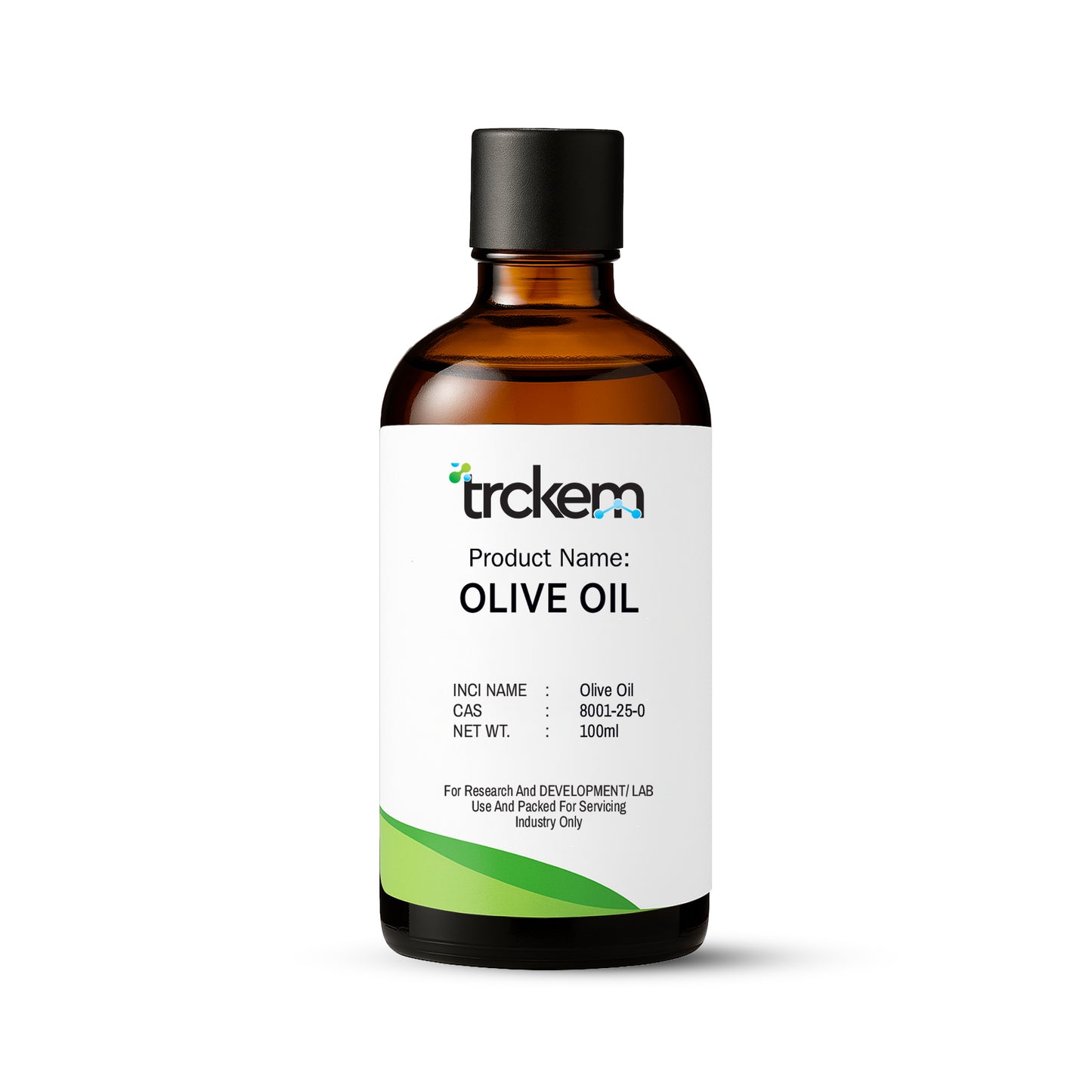
THE STORY OF OLIVE OIL

Olive Oil: The Nourishing Botanical Emollient for Soft, Healthy & Radiant Skin
Olive Oil is a rich, nourishing natural emollient extracted from the fruit of the olive tree (Olea europaea).
Packed with fatty acids, Vitamin E, squalene, and antioxidants, it deeply moisturizes, softens, and protects skin and hair.
Used widely in creams, lotions, hair oils, soaps, balms, and massage blends, Olive Oil is a staple of natural and clean-beauty formulations.

Cold-Pressed from Mediterranean Olives for Pure, Nutrient-Rich Quality
Cosmetic-grade Olive Oil is produced through:
• Washing & crushing fresh olives
• Cold-press extraction to protect nutrients
• Natural sedimentation or filtration
• Optional refining depending on grade
This method preserves beneficial compounds like oleic acid, phenols, and Vitamin E, ensuring high purity and skin-friendly performance.
TRCkem supplies refined and cold-pressed Olive Oil suitable for skincare and haircare formulations.

Moisturize. Repair. Protect.
Olive Oil offers numerous beauty benefits:
✅ Deep moisturization & skin nourishment
✅ Strengthens skin barrier and reduces dryness
✅ Rich in antioxidants → helps protect from environmental damage
✅ Provides shine, softness & conditioning to hair
✓ Ideal for sensitive, dry & mature skin
Used in: body lotions, moisturizers, baby oils, hair masks, soaps, scrubs, balms, massage oils & natural skincare products.

Gentle, Stable & Perfect for Natural Skin & Hair Formulations
• Typical use level:
– 2–20% in lotions & creams
– 2–10% in hair products
– 10–30% in massage oils & balms
• Add to oil phase of emulsions
• Compatible with butters, waxes, esters & essential oils
• Avoid very high heat to preserve nutrients
• Store in cool, dark conditions to prevent oxidation
• Safe, gentle & ideal for natural/clean-beauty formulations
Formulator’s Queries, We Answered
1. What is Olive Oil?
2. What is the CAS Number and INCI Name of Olive Oil?
CAS Number: 8001-25-0
INCI Name: Olea Europaea (Olive) Fruit Oil
3. What are the benefits of using Olive Oil in personal care products?
Deep Moisturization – Hydrates and nourishes dry skin.
Rich in Antioxidants – Contains Vitamin E and polyphenols that protect against free radicals.
Soothing & Anti-Inflammatory – Helps calm irritated and sensitive skin.
Improves Skin Elasticity – Enhances skin smoothness and firmness.
Hair Conditioning – Strengthens and softens hair while reducing frizz.
4. What are the common applications of Olive Oil in personal care?
Moisturizing Creams & Lotions – Provides long-lasting hydration.
Lip Balms & Lipsticks – Adds moisture and shine.
Hair Oils & Conditioners – Nourishes the scalp and hair strands.
Soaps & Cleansers – Acts as a natural cleansing agent.
Massage Oils – Used for its soothing and hydrating properties.
5. Is Olive Oil safe for all skin types?
Yes, Olive Oil is generally safe for all skin types, but individuals with acne-prone skin should use it cautiously as it is a heavier oil and may clog pores in some cases.
6. Can Olive Oil cause skin irritation?
Olive Oil is usually well-tolerated, but some individuals with sensitive skin may experience mild irritation or allergic reactions. A patch test is recommended before use.
7. Is Olive Oil environmentally friendly?
Yes, Olive Oil is biodegradable and derived from natural plant sources, making it an eco-friendly ingredient in personal care formulations.
8. Are there alternatives to Olive Oil in personal care products?
Yes, alternatives include:
Jojoba Oil – Lightweight and closely resembles skin’s natural sebum.
Coconut Oil – Provides deep hydration and antibacterial benefits.
Argan Oil – High in Vitamin E and fatty acids for skin and hair nourishment.
Shea Butter – Offers intense moisture and soothing properties



